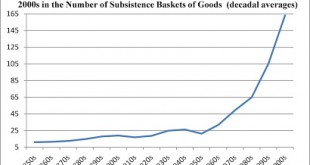In the videos below.But first let us look at Marx’s theory. It is that capitalists aim at increasing their theft of surplus value from workers.They can do this in three ways: (1) by increasing the length of the working day while holding down the real wage to a subsistence level (that is, increasing absolute surplus value);(2) decreasing the price of the basic commodities making up the value of the maintenance and reproduction of labour by automation, and thus reducing the real subsistence...
Read More »Marx’s Views on the Effectiveness of Trade Unions
Marx’s views are expressed well in Value, Price and Profit, which was a series of lectures he delivered in 1865, even though it was first published in 1898: “These few hints will suffice to show that the very development of modern industry must progressively turn the scale in favour of the capitalist against the working man, and that consequently the general tendency of capitalistic production is not to raise, but to sink the average standard of wages, or to push the value of labor more or...
Read More »Marx’s Capital, Volume 1, Chapter 14: A Critical Summary
Chapter 14 of volume 1 of Capital is called “The Division of Labour and Manufacture” and examines the nature of division of labour in early manufacture from the mid-16th to the late 18th centuries.Marx divides the chapter into five sections: (1) The Dual Origin of Manufacture.(2) The Specialised Worker and his Tools(3) The Two Fundamental Forms of Manufacture(4) The Division of Labour in Manufacture, and the Division of Labour in Society(5) The Capitalist Character of Manufacture. It is...
Read More »A Simple Challenge to Marxists on the Theory of Wage Determination in Volume 1 of Capital
To the Marxists everywhere, my simple challenge: Is your view that Marx’s theory of wage determination in volume 1 of Capital that real wages in capitalism can and will rise above the value of the maintenance and reproduction of labour, and in the long run will keep rising, vastly improving the living standards of workers? If you say “yes,” then my refutation here of Marx’s view of a rising rate of exploitation in capitalism (from increasing surplus value extracted from workers) is...
Read More »Böhm-Bawerk on Marx’s Problem of Aggregating Heterogeneous Human Labour
Böhm-Bawerk, in his 1896 essay “Karl Marx and the Close of His System,” understood the problem well: “ … [sc. Marx] declares that labor … means the ‘expenditure of simple [unskilled] labor power, an average of which is possessed in his physical organism by every ordinary man, without special cultivation"; or in other words ‘simple average labor’ (I, 51, and also previously in I, 46).‘Skilled labor,’ he continues, ‘counts only as concentrated or rather multiplied unskilled labor, so that a...
Read More »Marx’s Tendency of the Rate of Profit to Fall: Analytically and Empirically Unproven
The trouble with this idea of Marx is that, as formulated in volume 3 of Capital, Marx has insulated it against empirical refutation. As Michael Heinrich has argued here, it collapses into an anti-empirical and analytic tautology, which cannot be proven by empirical evidence. For Marx, it becomes a long-run tendency so that even if we had 1,000 years of capitalism and there was no long-run tendency of the rate of profit to fall visible in the data, Marx can evade criticism by claiming that...
Read More »Marx rejected Fiat Money
This can be clearly seen from Marx’s statement in Chapter 3 of volume 1 of Capital: “The State puts in circulation bits of paper on which their various denominations, say £1, £5, &c, are printed. In so far as they actually take the place of gold to the same amount, their movement is subject to the laws that regulate the currency of money itself. A law peculiar to the circulation of paper money can spring up only from the proportion in which that paper money represents gold. Such a law...
Read More »Marx’s Capital, Volume 1, Chapter 13: A Critical Summary
Chapter 13 of volume 1 of Capital is called “Co-operation” and it deals with the concept of cooperation of workers in production process and with historical aspects of the development of capitalist modes of production.Marx sees cooperation in capitalism as having three historical forms (1) simple co-operation, (2) manufacture, and (3) modern industry, but the earlier forms can persist within modern capitalism (Brewer 1984: 50).At the beginning of capitalist history, Marx sees changes in the...
Read More »Louis Boudin on the Contradiction between Volumes 1 and 3 of Marx’s Capital
From Louis Boudin’s book The Theoretical System of Karl Marx in the Light of Recent Criticism (1920): “The appearance in 1894 of the third volume of Capital created a sensation in interested circles. While it does not stand in any direct relation to the Revisionist movement, it can hardly be denied that it made its formal argumentation more plausible. The solution of the Great Contradiction contained in the third volume, and the rest of the matter therein contained and intimately connected...
Read More »Alexander Gray on the Two Contradictions in Marx’s Theory of Surplus Value in Volume 1 of Capital
From Alexander Gray’s book The Development of Economic Doctrine: An Introductory Survey (1956): “… the Marxian explanation suffers from two inner inherent contradictions (or two aspects of the same contradiction) from which it never escaped, and on which it finally made shipwreck in the third volume. In the first place, if all profit springs from variable capital and none from machinery, then it is the height of folly ever to introduce machinery, and it is a poor explanation to suggest that...
Read More » Heterodox
Heterodox

